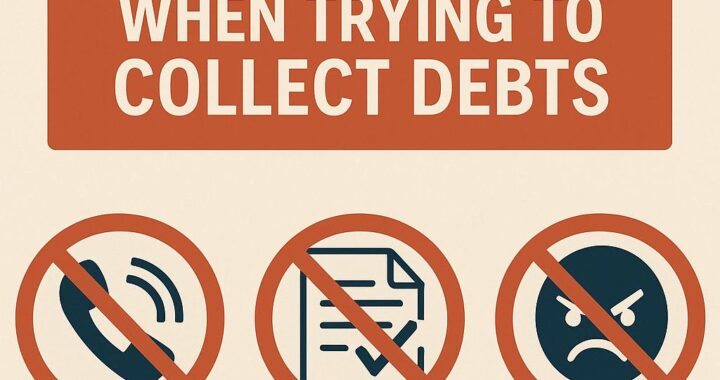Unpaid invoices can wreak havoc on your company’s cash flow, but how you handle collections can either solve the problem or make it worse. At Credit Counsel, Inc., we’ve worked with countless businesses that first tried to manage collections on their own—only to discover that their efforts were unintentionally undermining recovery.
Here are the top mistakes businesses make when trying to collect debts themselves, and some practical tips to help you avoid them:
1. Failing to Document Everything
The Mistake: Many businesses neglect to keep thorough records of their communications, payment terms, or previous collection efforts.
Why It Matters: Without documentation, you’ll have no foundation if the matter escalates to legal action or credit reporting. It also weakens your position when negotiating with the debtor.
How to Fix It: Keep a detailed paper trail of all invoices, contracts, emails, and phone logs. Document every attempt to contact the debtor and any responses received.
2. Being Too Aggressive (or Too Passive)
The Mistake: Some companies come on too strong with threats or constant calls, which can backfire. Others wait too long, hoping the customer will “come around.”
Why It Matters: Aggressiveness can damage your company’s reputation or trigger legal issues. Passivity, on the other hand, signals to the debtor that payment isn’t urgent.
How to Fix It: Stay professional and assertive. Communicate clearly and consistently, but within the boundaries of the law. Avoid personal attacks, and escalate appropriately when needed.
3. Ineffective Communication
The Mistake: Using vague language, sending generic letters, or relying solely on email or voicemail to get a response.
Why It Matters: If your message isn’t clear or doesn’t create a sense of urgency, it’s easy for a debtor to ignore you.
How to Fix It: Personalize your outreach, clearly state the amount owed and due date, and explain the potential consequences of non-payment. Use a mix of channels: phone, mail, email, and (when appropriate) certified letters.
4. Not Knowing the Law
The Mistake: Violating consumer protection laws, like the Fair Debt Collection Practices Act (FDCPA), even unintentionally.
Why It Matters: One wrong step can result in lawsuits, fines, or complaints that damage your company’s credibility.
How to Fix It: Educate your team on applicable local, state, and federal laws—or better yet, leave it to licensed professionals who specialize in debt recovery and compliance.
5. Letting Emotions Drive the Process
The Mistake: Taking non-payment personally and allowing frustration or anger to influence communication.
Why It Matters: Emotional responses can lead to poor decisions, such as threatening language or burning bridges with formerly good clients.
How to Fix It: Maintain a calm, business-like approach. Focus on resolution, not revenge. Stay focused on recovering the funds, not punishing the debtor.
6. Waiting Too Long to Get Help
The Mistake: Trying to handle collections in-house for too long, even when it’s clear your efforts aren’t working.
Why It Matters: The longer a debt goes unpaid, the harder it is to collect. After 90 days, your chances of full recovery drop significantly.
How to Fix It: Know when to escalate. If a debt is older than 60-90 days and you’ve made multiple attempts to collect, it’s time to bring in a professional collection agency.
Final Thoughts
Trying to collect debts internally may seem like a cost-saving measure—but if done incorrectly, it can cost you far more in lost revenue, legal headaches, and wasted time.
At Credit Counsel, Inc., we specialize in ethical, effective, and professional debt recovery services tailored to your industry. Whether you’re dealing with an old account or just need help building a more efficient collection process, we’re here to help.
Contact us today to learn more about how we can support your receivables management and help you get paid faster—without burning bridges.

